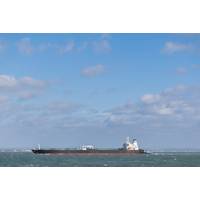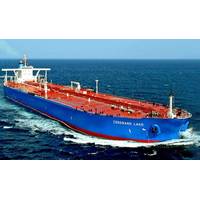Coronavirus Leaves China-bound Tankers Stranded

The coronavirus's effect on energy markets is worsening, as the sharp fall in demand in China, the world's largest importer of crude, is stranding oil cargoes off the country's coast and prompting shippers to seek out other Asian destinations.More than 1,360 people have died from the coronavirus in China, which has disrupted the world's second largest economy and shaken energy markets, with international benchmark Brent crude oil down 15% since the beginning of the year.Major international energy forecasters expect demand to fall in this quarter…
Start-up of Turkey's $6 bln STAR Oil Refinery Delayed
The commercial start-up of Turkey's new $6.3 billion oil refinery has been delayed until early next year and the plant is not expected to reach full capacity until mid-2019, three sources familiar with the matter said, as tests revealed minor faults.The 200,000-barrel-per-day STAR refinery, built by Azerbaijan's state oil firm SOCAR, is set to be a game changer for Mediterranean oil markets and will increase the country's total refining capacity by just over…
Angola to Export 49 Crude Oil Cargoes in Oct.
* Angola will export 49 cargoes of crude oil in October after 4 cargoes of new grade Gindungo were added to the preliminary programme, a trade source with direct knowledge said* The volume is up from 47 cargoes in September* The Gindungo grade first appeared in the September programme and the oil comes from a field at Total's major Kaombo project offshore AngolaReporting By Julia Payne
Kutubu Light Crude Oil Exports to Resume in Spot Trade
Sales of Kutubu Light crude oil cargoes will resume in the Asia spot market in July after a major earthquake in Papua New Guinea shut production from late February to early April, three industry sources said on Monday.While production at the facility resumed in early April, producers of the light crude oil have been trying to meet previously committed cargoes to buyers which had been delayed due to the earthquake, one of the people said.The sources declined…
Ineos: Forties Oil Flows Back to Normal 'Around New Year'
All restrictions of flows have now been lifted; force majeure on supply still in place. Britain's biggest and most important oil and gas pipeline Forties should resume normal flows around the new year, slightly earlier than previously flagged, its operator Ineos said on Thursday. Ineos had previously expected the pipeline, which suffered a rare unplanned shutdown because of a crack, to resume normal operations in early January. The closure since Dec. 11 of the pipeline…
Force Majeure Declared on Some North Sea Liftings
Pipeline shut on Dec. 11; repair work could last several weeks. Deliveries of crude oil through the Forties pipeline in the North Sea are under force majeure for the first time in decades and operator INEOS said on Thursday there was no timeline yet for repair work that could last several weeks. The 169-km pipeline, which carries around a quarter of all North Sea crude output and around a third of Britain's total offshore gas production, has been closed since Monday, following the discovery of a small crack in part of the system onshore in Scotland.
India's Reliance Makes First Purchase of US Crude
India's Reliance Industries Ltd, owner of the world’s biggest refining complex, has bought its first ever crude oil cargoes from the United States, drawn by the oil's economics after the price spread between U.S. crude futures and Brent futures widened, three trade sources said on Tuesday. Reliance bought 1 million barrels each of West Texas Intermediate (WTI) Midland and Eagle Ford crude which are expected to arrive in November, they said. (Reporting by Nidhi Verma, Florence Tan and Jessica Jaganathan)
China Suitor Tightens Grip on Curacao Oil Project
China's Guangdong Zhenrong Energy Co will submit a plan by April to revamp a century-old oil refinery in Curacao, as it seeks to secure a $5.5 billion project that will give China a foothold in the Caribbean's second-largest oil refinery. Guangdong Zhenrong, a commodity trader with strong backing from Beijing, signed a binding framework pact with Curacao's government on Nov. 19, Chen Bingyan, the firm's director and chief negotiator for the venture, told Reuters, moving past a memorandum of understanding in September.
Asia VLCC Rates Hold Steady after Near 4-week High

Freight rates in Asian trades for very large crude carriers (VLCCs) are set to hold steady around current levels next week, after hitting a near four-week high on Thursday, as tanker supply matches cargo demand. "I can't see the market crashing, or spiking. There are enough ships - there is no real shortage of tonnage," a Singapore-based supertanker broker said on Friday. Around 32 VLCC cargoes have been fixed for loading in the Middle East in the first 10 days of March with 6 to 12 charters still to be agreed, he said.
West African Crude Under Pressure in Quiet Trading
Physical trading of West African oil started slowly this week, with pending tenders and industry events in London forestalling most new physical deals. More than half of Nigeria's March export programme has yet to trade, and traders said Nigerian crude oil sellers would have to lower their offers in order to offload remaining volumes from the March loading programme. Faltering gasoline and naphtha margins had also thrown into question the demand for Nigeria's light, sweet oil.
West Africa Crude Exports to China at Four-year Low
West African crude oil exports to China were set to fall to a four-year low in October, reflecting the key buyer nation's cooled interest in spot crude imports in the early autumn. The decline, shown in a Reuters survey of oil traders and shipping fixtures, pushed overall exports to Asia to the lowest since September 2013, despite buying from several Indian refineries including Reliance and state-run IOC, HPCL and BPCL. Refinery runs in Asia are lower as a result of seasonal maintenance, which capped their need for crude oil cargoes.
Kuwait Petroleum Aims to Boost Outlets for Its Fuels in Europe
Kuwait Petroleum International (KPI) is planning more investments in Europe, including into storage terminals and other oil-related facilities to help to provide more outlets for the fuels it produces. Khaled Al-Mushaileh, KPI's vice president Europe, told the Platts refining conference in Brussels that his company views Europe as an important market and plans to expand in retail and downstream sectors. KPI, a subsidiary of Kuwait's national oil company Kuwait Petroleum Corporation…
W. Africa Crude-Angola clears, with Help from Open Arbs
A spate of last-minute buying cleared out much of the October Angolan crude oil cargoes just before the next month's programme emerged, but only after sellers discounted heavily. Chinese traders returned to the spot market late in the week, but open arbitrage to the United States and Europe aided enormously in a difficult environment for West Africa crude. "The freight (to Europe) is very cheap ... and all people are trying to delay maintenance to enjoy the good margins," one trader said.
Saudi Shipper Bahri in Deal with South Korea's S-Oil
National Shipping Company of Saudi Arabia (Bahri) has agreed with South Korea's S-Oil Corp to ship crude oil cargoes from the third quarter of this year. Under the 10-year contract, Bahri will ship the oil on very large crude carriers (VLCCs) from the Arabian Gulf and Red Sea to the port of Onsan in South Korea, Bahri said on Wednesday. Bahri expects to book revenues of at least 250 million riyals ($67 million) annually from the deal. It became the sole provider…
North Asian Refiners Slash Spot Prices on Weak Demend
Competition from US shale leaves naphtha margin at 26-month low; North Asian refiners sell gasoil, naphtha at deep discounts. Refineries could make run cuts if margins continue weak. North Asian refineries are slashing spot prices of most oil products to multi-year lows to get rid of high inventory as they battle weak regional demand and competition from a booming U.S. shale market, industry sources said. Some might also consider run cuts if oil product margins continue to slide and supplies remain ample.
Oil Below $108 on Excess Supply, Weak Demand
Demand weak in Europe and Asia but supplies ample; Gaza fighting subsides with Hamas backing 24-hour truce. U.S., EU prepare more sanctions on Russia over Ukraine. Brent crude oil slipped below $108 a barrel on Monday as weak demand in Europe and Asia and ample supply in the Atlantic basin outweighed worries over political tensions in Ukraine and the Middle East. North Sea and West African physical crude markets are over supplied, traders and brokers say, with sellers discounting heavily in an effort to attract buyers such as oil refiners.
High Shipping Costs Deter Buyers of W. Africa Crude
Nigerian crude oil differentials held at two-year lows on Monday as demand remained subdued, partly due to high shipping costs from West Africa to Europe. Nearly half of the loading program for August, which originally had 65 cargos, was unsold on Monday. But traders said that demand might pick up temporarily later this week as traders placed cargoes for India Oil Company's import tender. High freight rates aboard suezmaxes to Europe are deterring shipments to refineries there, traders said. Rising exports of similar oil grades from Libya has also hurt demand.
Saras Urges European Steps on Refining as Profit Slumps

Italy's Saras urged Europe to take steps to restore the competitiveness of the region's refining sector after it posted an 85 percent slump in its core earnings in the first three months due to weak refining margins. Europe's refining sector is facing growing pressure from increasing international competition, excess production capacity and weak domestic consumption. "We hope that the European Authorities will finally become fully aware that the competitiveness of this absolutely strategic sector is progressively being eroded…
U.S. Modifies Order on Crude-by-Rail Shipments
Reuters- The U.S. Department of Transportation on Thursday issued a modified order governing the shipment of crude oil via railway tank cars that it said would clarify and supercede guidelines issued on Feb. 25. The agency said that effective immediately, testing must have been conducted to determine the flash point and boiling point of crude oil cargoes that will be shipped in tank cars. New shipping guidelines follow a series of fiery accidents involving crude oil being moved by rail in the United States and Canada.
